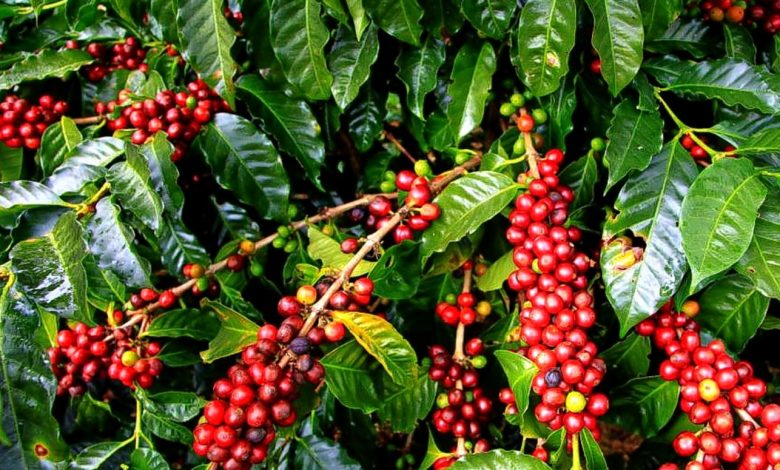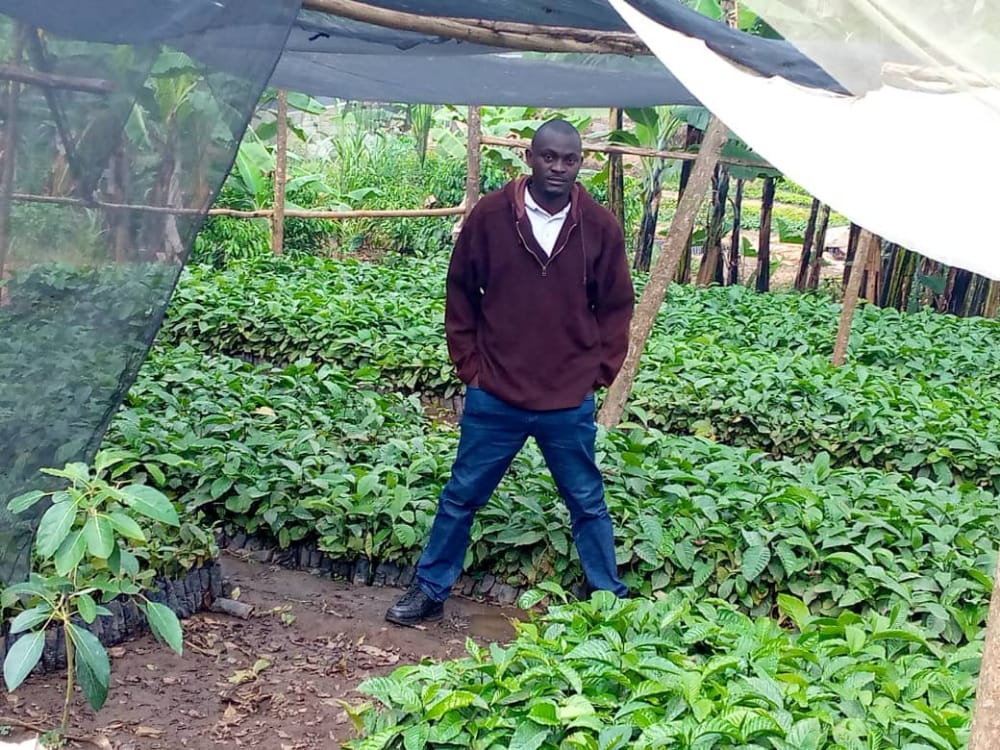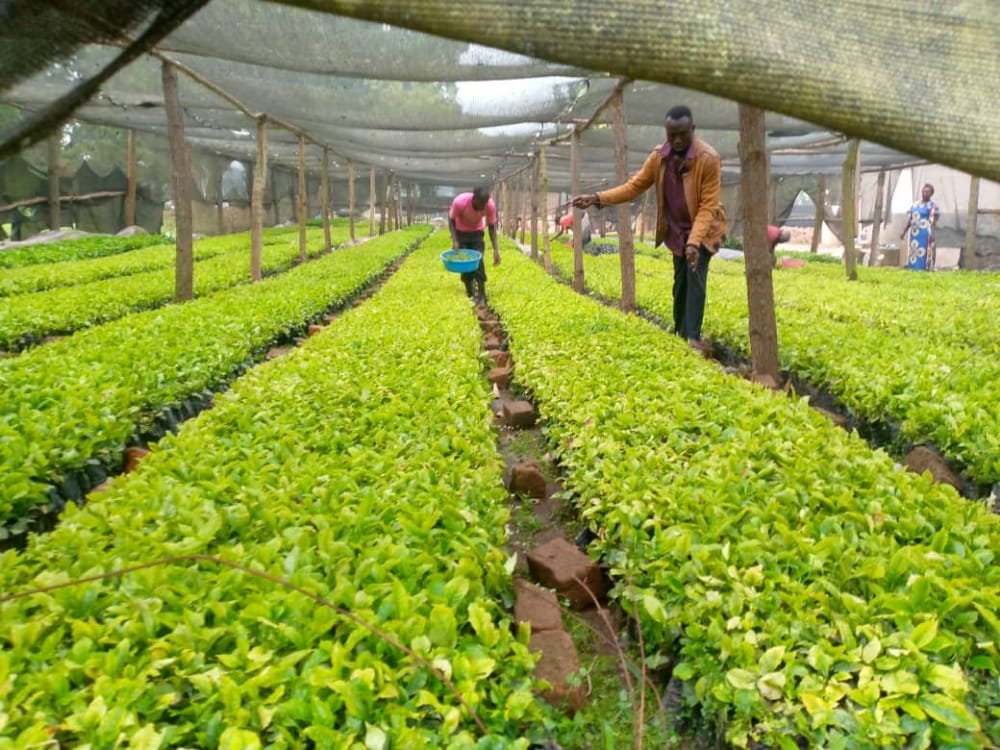
Taddewo Senyonyi, the journalist who fell in love with coffee farming
The story of Taddewo William Senyonyi, a journalist and the founder of Pearl Model Farm & Agri-Consult Ltd is one that adds meaning to the wisdom of encouraging young people not to look at one source of income but multiple sources.
Starting
“I grew up in a rural farming family where coffee was one of the major cash crops. My parents had about two acres of coffee in the 1990s and early 2000s. They used to get some good money those days which they used to pay for me and my siblings’ school fees. I remember my father using some of the money from coffee to buy a plot of land in our trading centre (Kikaada Trading Centre) and built a commercial house,” Senyonyi begins his success story of coffee farming.
He says during school holidays in November and December, his parents would ensure the children join them to pick the red coffee berries not only to ensure they raise school fees but to also see to it that they learn the trade.
He adds this is how he fell in everything coffee but unfortunately, the coffee wilt disease razed down all their coffee plantations.
“When I finished my Journalism degree from Makerere University in 2011, I started writing agribusiness stories and in the process came into contact with successful coffee farmers and key players along the coffee value chain. This re-energized me and rekindled my love for coffee.”
He explains in 2013, he started by operating a small coffee nursery bed after getting elite Robusta coffee seeds from the Uganda Coffee Development Authority (UCDA).
This marked his journey into coffee growing.
“I raised about 20,000 seedlings and distributed half of them to members of a small association which I had started. I gave them the seedlings free of charge. I only planted two acres and concentrated on the nursery bed business,” he says.
“When I learnt that government was phasing out elite seedlings for Clonal KR varieties, I changed strategy and started another garden for clonal coffee plantlets which I sell now. I have two nursery sites; one in Wobulenzi, Luweero and another in Kakumiro Town Council, Kakumiro district.”
He says in 2019, he resumed coffee planting and currently has close to 10 acres at different stages.

Challenges
Senyonyi says that like any other business, his coffee farming project has not been free of challenges.
The biggest challenge was limited capital to inject in the business. Running a nursery bed professionally is not a walk in the park because you need a lot of money to buy shade nets which can cost as high as Shs2 million for the start. You need reliable water and workers,” Senyonyi narrates.
He says that to overcome these challenges, he always used part of his meager salary from journalism to meet these financial obligations including looking after his family.
He however says this is no longer a problem since the business has greatly grown.
Senyonyi says that he also faces a problem of delayed payment for the seedlings supplied to various people and organisations.
“There’s a time when I supplied Uganda Coffee Development Authority with coffee seedlings but payment came through after two years. This can be frustrating and it is worse for big players who get bank loans to inject into their farms.”
He says that on the farming side, the biggest challenge is drought which leads to lower production as coffee flowers fall off due to lack of adequate rains to support them develop into beans.
“This means for any serious commercial farmer, irrigation is the way to go but it remains quite expensive. I have a water pump and a few pipes that I use to move around watering the coffee during the dry spell but I can only water a few. It’s quite draining.”
He says that he also dug up a deep well to help provide enough water throughout the year but insists he doesn’t have enough resources to put up a proper irrigation system.
Just like any other crops, pests and diseases remain a challenge for Senyonyi’s coffee farm, adding that matters have been worsened by the substandard yet expensive pesticides on the market.
“Unreliable farm workers is yet another challenge since many young people either don’t want to work hard or are lured to other farms. This would be okay, but this is after you have trained them in the best agronomic practices regarding coffee farming. When you get new ones, you start afresh. However, I have developed a system that tries to retain key workers so that when new ones come in, the existing ones are able to teach them what coffee farming is about,” he says.
Juggling coffee farming with journalism
Whereas it is a bit challenging, Ssenyonyi says he is able to juggle journalism and coffee farming.
Senyonyi is a co-founder and Managing Editor of an online business website called Business Focus as well as the founder of Pearl Model Farm & Agri-Consult Ltd, a company mainly dealing in coffee business, goats and general farming consultancy.
As a journalist, he says he tries to inspire people through writing agribusiness and development related stories full of life lessons.
“It’s a bit challenging since human beings can sometimes disappoint. That said, for the nursery bed operations, I have partners and shareholders I work with. These are always on the ground, so they run the day-to-day operations of the nurseries. They know they are part of the business, so they try to do their best. My role is mainly to guide them,” he says.
Future is bright
Senyonyi is optimistic the best is yet to come in regards his coffee farms that he says will fetch him a lot of money.
“In the next five years I want to be running a modern agritourism farm in Kakumiro district, with coffee being the main crop. We shall have modern structures at the farm both for the workers and our visitors. Since I am based in Kampala and my work is mainly online, I have embarked on the process of setting up an office at the farm so that I can do my journalism while there and at the same time attend to the farm,” Senyonyi says.
“By end of this year, the upcountry office should be operational. This means that it will be possible for me to for example spend a week at the farm.”

Advice
Senyonyi cannot end his story of juggling journalism with coffee farming without offering a piece of advice to both government and fellow youth.
“Uganda wants to be producing 20 million bags (60kg each) of coffee by 2025 but this can only be achieved if the government identifies and supports serious commercial farmers like me. I have heard about water for production in the Ministry of Water and Environment, but you hardly come across farmers who have benefited from it. I would request that the government supports commercial coffee farmers with irrigation systems at subsidized prices,” he says.
“I also urge government to handle the issue of fake and substandard agro-inputs. The prices of agro-inputs such as fertilizers, pesticides and fungicides remains expensive, so government should subsidize them.”
To fellow youth, Senyonyi says nothing is impossible if they work hard to achieve whatever they want.
“You can be what you want to be. It’s all about you! The power is in your hands. If you choose to start something or business that you are passionate about, start with the little you have because if you don’t start now, you will probably never start. If you have land (it could be your parents’ land), coffee is the thing. It’s the green gold. This is because a hectare which is approximately two and a half acres of land can give you Shs28 million annually in gross earnings. This is after you have applied the best agronomic practices.”
He reminds the youth that since coffee is a generational crop, if one plants it while still young, they are preparing for their retirement early enough.
“With climate change before us and looking at the global trends, farmers who will look after their coffee well and apply irrigation, they will with no doubt become the millionaires of the future,” he says.



